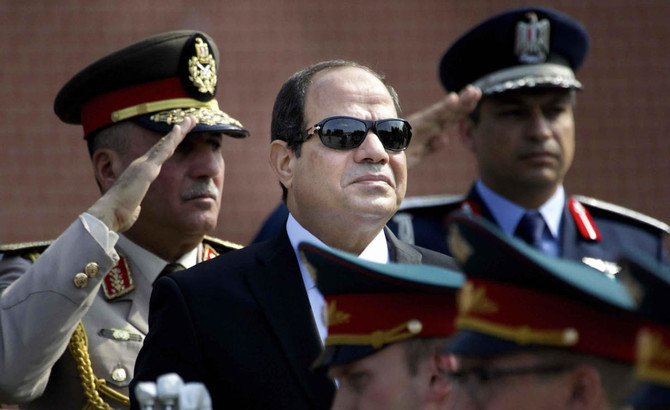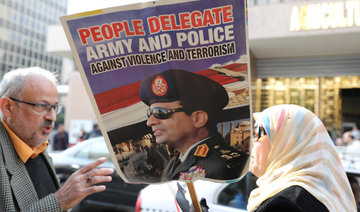CAIRO: Egypt’s president on Wednesday angrily threatened to take strong action against anyone trying to disrupt the country’s stability in a warning that followed calls by opposition politicians for a boycott of upcoming presidential elections.
The sharp warning by a visibly furious President Abdel-Fattah el-Sisi was a signal that authorities will tolerate no questioning of the legitimacy of the March 26-28 vote. The general-turned-president said he would not allow a repeat of the 2011 uprising.
Those calling for a boycott have called the election a farce after a string of would-be candidates were arrested, forced out of the race or dropped out in protest. It had appeared el-Sisi might be the only one to run until at the last minute on Monday a little-known politician stepped forward to enter the race as a face-saver.
That prevented the embarrassment of a one-candidate election, but also sparked considerable mockery on social media. Criticism of the vote could taint what is seen as el-Sisi’s inevitable victory and open the door to wider dissent, which his government has largely shut down over the past four years.
The boycott call came Tuesday from a coalition of opposition parties and public figures. Earlier this week, five opposition figures, including a 2012 presidential candidate and two top campaign aides for a now-arrested presidential hopeful, also called for a boycott and urged Egyptians not to recognize the vote’s outcome.
One would-be candidate forced out of the race, former lawmaker Mohammed Anwar Sadat, called on the opposition to stage a peaceful march on the presidential palace to present el-Sisi with “demands” pertaining to the country’s political future. Sadat is a nephew of assassinated Egyptian leader Anwar Sadat.
El-Sisi did not directly mention the boycott calls during his speech at a ceremony marking the launch of a giant offshore gas field. But the timing a day after the calls suggested he was referring to them — and his vehemence appeared to suggest that any questioning of the election was considered equivalent to destabilizing the country.
Grim-faced and at times shouting, el-Sisi implied he would launch an intensified crackdown. “There will be other measures against anyone who believes he can mess with (Egypt’s) security ... I fear no one but God,” he said.
“Whoever wants to mess with Egypt’s security and wreck it must get rid of me first because by God Almighty I will not allow it. I would die so that 100 million can live,” he added.
He said that if attempts to destabilize the nation continue, he would call on Egyptians to give him “another mandate” to counter what he called the “evil people.”
That was a reference to the “popular mandate” that el-Sisi asked for to fight terrorism in July 2013, just after he led the military’s ouster of Muhammad Mursi, Egypt’s first freely elected president whose one year in office proved divisive. Millions took to the streets in response to his call, and el-Sisi then launched Egypt’s largest and harshest crackdown on dissent in decades, arresting thousands.
In his warnings Wednesday, el-Sisi also made a rare reference to the 2011 uprising that forced autocrat Hosni Mubarak to step down.
“Be warned, what happened seven or eight years ago will not be repeated. ... You seem not to know me well enough. No, by God, the price of Egypt’s stability and security is my life and the life of the army,” he said, directing an intense gaze at Defense Minister Sidki Sobhi, seated to his left. “I am not a politician who just talks,” he added.
His reference to the uprising had echoes of the line that is presented almost daily in pro-government media demonizing the 2011 “revolution” as a foreign plot to destabilize Egypt carried out by paid agents. Many of the uprising’s key figures are either in jail, live in exile or quietly moved to the sidelines.
El-Sisi has consistently cited security and economic recovery as taking precedence over freedoms. He often complains of the political turmoil after 2011 that wrecked the economy.
In office, el-Sisi has pursued mega infrastructure projects and painful austerity measures to repair the economy, stopping a slide in bankruptcy but also sending prices soaring beyond the reach of a majority of Egyptians.
“Stability and security means where we are now, anything else is doom. Please, don’t let anyone lead (the nation) to doom,” he warned.
Egypt’s leader issues tough warning after election criticism
Egypt’s leader issues tough warning after election criticism

The bodies of a Belgian mother and her son were recovered in southern Jordan after flash flooding
Fourteen tourists, all Czechs, were rescued on Sunday
AMMAN: Search and rescue teams recovered the bodies of a Belgian mother and her son on Monday in Jordan, police said a day after the woman and her three children were reported missing in flash flooding. The other two children were found alive.
Sunday’s flooding in southern Jordan also led to the evacuation of hundreds of tourists from the Petra archaeological site, the country’s main tourist attraction.
The mother and children had been part of a group of 18 tourists who had been on an adventure trip in Wadi Al-Nakhil when they were caught up in the flash flood, Ma’an district local governor Hassan Al-Jabour told state media broadcaster Al-Mamlaka TV.
Fourteen tourists, all Czechs, were rescued on Sunday. Rescue crews located two of the children alive late Sunday, Al-Jabour said. The search and rescue operation was suspended at about 2 a.m. because of the complicated weather conditions and terrain. The bodies of the woman and her son were found Monday morning after the search resumed, he said.
Further details about the family and the ages of the children weren’t immediately available.
Jordan often experiences flash flooding as heavy seasonal rains send torrents of water through dry desert valleys. At least three people died in 2021 when floodwaters swept away their car, while more than 30 people in the Dead Sea region and other parts of Jordan were killed in flash flooding in 2018.
UAE president stresses regional peace during meeting with Turkish foreign minister

- Leaders examined the strategic relationship between Ankara and Abu Dhabi
LONDON: UAE President Sheikh Mohamed bin Zayed Al-Nahyan met with Turkish Foreign Minister Hakan Fidan at the Qasr Al-Shati palace in Abu Dhabi on Tuesday.
They examined the strategic relationship between Ankara and Abu Dhabi, seeking ways to enhance it according to their mutual interests, the Emirates News Agency reported.
Sheikh Mohamed and Fidan discussed regional and international issues, highlighting developments in the Middle East. They stressed the necessity of fostering regional peace and stability in a way that benefits all nations.
The meeting was attended by several senior officials, including Sheikh Hamdan bin Mohamed bin Zayed Al-Nahyan, the deputy chairman of the Presidential Court for Special Affairs; Sheikh Mohamed bin Hamad bin Tahnoun Al-Nahyan, the adviser to the UAE president; Ali bin Hammad Al-Shamsi, the secretary-general of the Supreme Council for National Security; and Khalifa Shaheen Al-Marar, the minister of state.
Emir of Qatar discusses ties in phone call with India PM Modi

- The leaders shared perspectives on regional and international developments of mutual concern
LONDON: The Emir of Qatar Sheikh Tamim bin Hamad Al-Thani discussed ties with Indian Prime Minister Narendra Modi during a phone call on Tuesday.
The leaders discussed ways to strengthen the relationship between Doha and New Delhi. They also shared perspectives on regional and international developments of mutual concern, according to the Qatar News Agency.
Sheikh Tamim visited India last February to enhance bilateral collaboration between the two countries in areas such as trade, investment, energy, and finance.
Attack on MSF hospital in South Sudan was deliberate, UN rights commission says

- “This was not a tragic accident. It was a calculated, unlawful attack on a protected medical facility,” Sooka
- “The aerial bombing of the MSF hospital in Old Fangak is a flagrant violation of international humanitarian law”
NAIROBI: A bombing attack on a Medecins Sans Frontieres hospital and pharmacy in South Sudan over the weekend was deliberate and may amount to a war crime, the UN Commission on Human Rights in South Sudan said on Tuesday.
MSF said on Saturday that at least seven people had been killed and 20 wounded in South Sudan’s Fangak county when a bomb was dropped on the pharmacy, burning it to the ground and damaging the hospital, followed by another drone attack on Old Fangak, a town in the Greater Upper Nile region.
No one claimed responsibility for the attack, which came on the heels of air strikes and heavy clashes in the region in recent months between national forces and an ethnic militia allegedly allied with First Vice President Riek Machar.
“This was not a tragic accident. It was a calculated, unlawful attack on a protected medical facility,” Yasmin Sooka, chair of the commission, said in a statement.
“The aerial bombing of the MSF hospital in Old Fangak is a flagrant violation of international humanitarian law and could amount to a war crime ...
“Targeting medical facilities and services violates the Geneva Conventions and represents a direct assault on foundations of humanitarian action that are intended to protect civilians in conflict zones.”
Information Minister Michael Makuei did not respond to requests for comment.
South Sudan has officially been at peace since a deal in 2018 ended a five-year civil war between forces loyal to President Salva Kiir and fighters loyal to Machar.
But the house arrest of Machar in March on accusations of trying to start a rebellion has sparked international concern that conflict could reignite.
UN urges probe into 'disturbing' video of abducted Libyan MP

- UNSMIL said it was “alarmed” by Ibrahim el-Dirsi’s “enforced disappearance”
- It described circulating images of his detention as “disturbing“
TRIPOLI: The UN mission in Libya on Tuesday called for an independent investigation into images of an abducted member of the country’s eastern-based parliament that showed signs of torture.
In a statement, UNSMIL said it was “alarmed” by Ibrahim el-Dirsi’s “enforced disappearance” and described circulating images of his detention as “disturbing.”
Dirsi, a member of the Libyan house of representatives, was kidnapped in May 2024 in Benghazi, Libya’s second largest city which he represents.
The North African country has been mired in unrest since the 2011 NATO-backed uprising that toppled dictator Muammar Qaddafi.
It remains split between the UN-recognized Government of National Unity (GNU) in Tripoli, and a rival eastern administration backed by military strongman Khalifa Haftar.
On Monday, Libya’s Al-Ahrar TV aired photos and a video showing Dirsi, apparently in a prison cell, wearing only shorts and chained with a padlock around his neck.
UNSMIL said it had asked UN digital forensic experts to verify the footage’s authenticity.
Tripoli’s GNU described the conditions in the images as “degrading, shocking and inhumane.”
It criticized the “so-called General Command,” referring to Haftar’s forces, after the video appeared to show Dirsi pleading for forgiveness.
The pro-Haftar Al-Masar TV channel quoted lawmakers as saying the images were “fabricated” and “produced using artificial intelligence.”
The eastern-based interior ministry blamed “unidentified criminals affiliated with a gang,” saying the case was under “thorough investigation.”
UNSMIL also condemned “widespread and systemic abuses in detention facilities by law enforcement and security actors in Benghazi, Tripoli, Sabha, and other locations across Libya.”
It said “arbitrary detentions, abductions, torture, enforced disappearances and deaths in custody are serious human rights violations and may constitute international crimes that can be prosecuted by the International Criminal Court.”
“Libyan authorities must ensure these practices immediately cease and that perpetrators are brought to justice,” the statement added.
In 2019, Siham Sergewa, another representative in Benghazi, was abducted from her home shortly after criticizing Haftar on television. She remains missing.



















